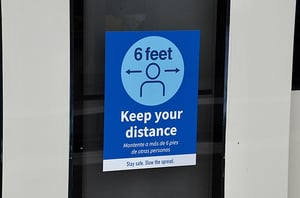Businesses of all sizes have been dramatically impacted by COVID-19 pandemic closures and restrictions. Even in regions that have progressed through phased re-openings, the data suggests consumers are still staying home in droves, spending less money overall, or seeking alternative ways to get what they need. Economic developers and chambers of commerce can make a critical difference by supporting their area businesses through these uncertain times. Here are five specific, practical ways economic developers can help the restaurants, retailers, service providers, manufacturers and other businesses in your area.
First of all, it's helpful to understand the challenges your area businesses are facing right now. Some of this reticence is based in public health fears about spreading or contracting the virus, some may be caused by civil unrest, and some of it is belt-tightening due to unemployment at record levels and deep concern about personal finances. A McKinsey.com report from May 12th found that 63% of Americans expect they will need to adjust their normal routines for four or more months; 53% of them expect it to impact their personal finances. That numbers is significantly higher in Europe and other parts of the world. As the pandemic recedes in some areas and new hotspots emerge in others, it's critical to help business stay afloat despite the uncertainty that threatens their livelihood.
1) Help your area residents find and support your local businesses
Now is not the time for online shopping with outside retailers. 90% of any region's jobs come from the small and medium-sized businesses in their area. Our new ZoomBusiness map directory of local businesses has been an unqualified hit for regions across the US and Canada seeking to support their area businesses. Now implemented in more than 80 communities, our clients have collectively listed more than 15,000 businesses, so consumers can find restaurants, retailers, service providers, and health care clinics to support in their regions.
We've provided this service free to existing clients for a limited time but it's also available as an a la carte service on its own, for extremely affordable rates indexed to your populations size. Get in touch today and we can have it ready for you within one business day. We'll even help you get the word out so businesses can add themselves (or you can add them with a spreadsheet) and so consumers know they can use it.

Offer resources, training and workshops to help them adapt to new trends
Businesses that are able to adapt to the new normal are the most likely to survive. Some of them just happen to be in the right industry (say medical supplies, digital technology or grocery stores), others have been able to pivot to new directions (like this aircraft simulation software company now making ventilators), and others have adapted with new websites or ways of reaching their customers. Economic developers, chambers and municipalities that facilitate and support these changes can make a big difference for the small and medium-sized businesses that can't afford consultants or new hires and need to learn to do these things on their own. Workshops and online training or support, as well as virtual spaces for crowdsourcing solutions (like a LinkedIn or Facebook group for local businesses) can prove tremendously helpful.
2) Help area businesses communicate with their customers
 Businesses that relied on foot traffic, in-person visits, and conventional supply chains may find themselves struggling to communicate with their customers. In addition to the training and support they may need to set up websites, use social media effectively, produce new signage, set up email campaigns or use direct mail, you can help them amplify their message online on your own website and with your organization's social channels. A well-timed retweet or share can make a huge difference for small business. Create, use and promote a local hashtag so you get automatic alerts and can help amplify their posts. For example, the city of Abbotsford (BC) uses #BizFriendlyAbby. What hashtag could you use in your community?
Businesses that relied on foot traffic, in-person visits, and conventional supply chains may find themselves struggling to communicate with their customers. In addition to the training and support they may need to set up websites, use social media effectively, produce new signage, set up email campaigns or use direct mail, you can help them amplify their message online on your own website and with your organization's social channels. A well-timed retweet or share can make a huge difference for small business. Create, use and promote a local hashtag so you get automatic alerts and can help amplify their posts. For example, the city of Abbotsford (BC) uses #BizFriendlyAbby. What hashtag could you use in your community?
3) Show them how to improve their search rankings if they have a website
Now, more than ever, it's critical to have an effective presence online. Many independent brick and mortar retailers have quickly set up websites or improved existing ones in order to connect with their customer base but they may not have adopted best practices in the rush to get online. Showcase local SEO experts and marketing agencies in webinars or virtual training to help business owners ensure their websites can be found by their target customers. It's just as important for EDOs and chambers to take a critical look at their own websites and see how well they are faring themselves. This list of free SEO tools is a great place to get started.
4) Help them understand new requirements for conducting business in your area & find aid resources
 Are masks required? Physical distancing in place? Do patrons need to be seated six feet apart or limit how many can enter a business at one time? Offer them clear links to updated requirements. At the same time, everyone's concerned about protecting and supporting small businesses and there are many different kinds of programs in different towns, counties, states, provinces and at the federal level. Imagine being a store, restaurant or service owner dealing with all the stressors of the pandemic and having to navigate through all this information? Many economic development organizations and chambers have responded by aggregating all of this information into a section of their website. Check out examples here for the City of Sacramento (CA) and the Niagara Region in Ontario, Canada.
Are masks required? Physical distancing in place? Do patrons need to be seated six feet apart or limit how many can enter a business at one time? Offer them clear links to updated requirements. At the same time, everyone's concerned about protecting and supporting small businesses and there are many different kinds of programs in different towns, counties, states, provinces and at the federal level. Imagine being a store, restaurant or service owner dealing with all the stressors of the pandemic and having to navigate through all this information? Many economic development organizations and chambers have responded by aggregating all of this information into a section of their website. Check out examples here for the City of Sacramento (CA) and the Niagara Region in Ontario, Canada.
5) Facilitate shifting supply chains and regional procurement by helping your region's businesses find each other
Mapping the existing businesses, industries and clusters in your region is incredibly helpful to companies looking at shifting supply chains and regional procurement. Buy local campaigns are relevant not just for consumer but for B2B companies as well. ZoomProspector's Business Reports and Business Intelligence Component is highly values by economic developers and business owners for its robust, reliable and easy-to-analyze data by business name, keyword, NAICS code and major SIC. See them in action here in Pasadena EDC (TX) and Conway (SC)
Want to learn more about how online GIS data tools can assist local businesses and attract new investors? Book a customized assessment and demo with our sales team today.

